Experiments cannot validate hypotheses, only falsify them. The statement above can be restated in which of the following ways?
a. Until disproved, an explanation for an observation is valid.
b. Certain concepts cannot be subjected to direct experimentation.
c. A hypothesis that has not been falsified remains provisional.
d. Proving a hypothesis exempts it from further testing
Correct Answer : C
The statement "Experiments cannot validate hypotheses, only falsify them" can be restated as "A hypothesis that has not been falsified remains provisional." This means that a hypothesis is considered valid until it is disproved by experimental evidence. However, even if a hypothesis has not been falsified, it is still considered provisional and subject to further testing and scrutiny.
a."Until disproved, an explanation for an observation is valid" is similar to the correct answer but does not capture the provisional nature of a hypothesis.
b."Certain concepts cannot be subjected to direct experimentation" is not a restatement of the original statement.
d. "Proving a hypothesis exempts it from further testing" is incorrect because no hypothesis can be definitively proven and all hypotheses are subject to further testing and scrutiny.
TEAS 7 Exam Quiz Bank
HESI A2 Exam Quiz Bank
Find More Questions 📚
Teas 7 Questions: We got the latest updated TEAS 7 questions
100% Money Refund: 100% money back guarantee if you take our full
assessment pass with 80% and fail the actual exam.
Live Tutoring: Fully customized live tutoring lessons.
Guaranteed A Grade: All students who use our services pass with 90%
guarantee.
Related Questions
Correct Answer is C
Explanation
The organ that filters excess solutes from the blood is the kidney ¹. The kidneys are a pair of bean-shaped organs located on either side of the spine, just below the rib cage ². They are responsible for filtering waste products and excess fluid from the blood and excreting them in the form of urine ².
The other options are not correct because they do not accurately describe the organ that filters excess solutes from the blood. The stomach, spleen, and gallbladder do not filter excess solutes from the blood.
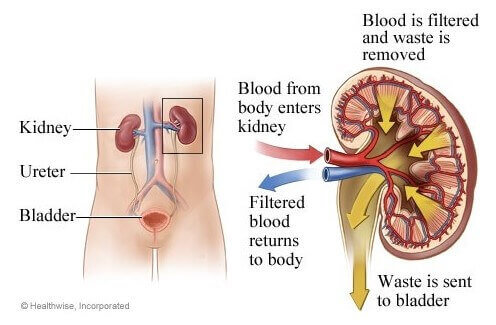
Correct Answer is D
Explanation
D. The opening of potassium channels allowing potassium to leave the neuron
The correct answer is d. The opening of potassium channels allowing potassium to leave the neuron. Repolarization of a neuron occurs after an action potential, when the neuron's membrane potential returns to its resting state. This is achieved by the opening of potassium channels, which allows potassium ions to flow out of the neuron. This movement of positively charged ions out of the neuron helps to restore the negative membrane potential.
A. The inhibition of sodium and potassium pumps would not allow for repolarization because these pumps are necessary for maintaining the resting membrane potential.
B. The opening of sodium channels would cause depolarization, not repolarization.
C. The closing of both sodium and potassium channels would restrict ion movement, but it would not allow for repolarization.
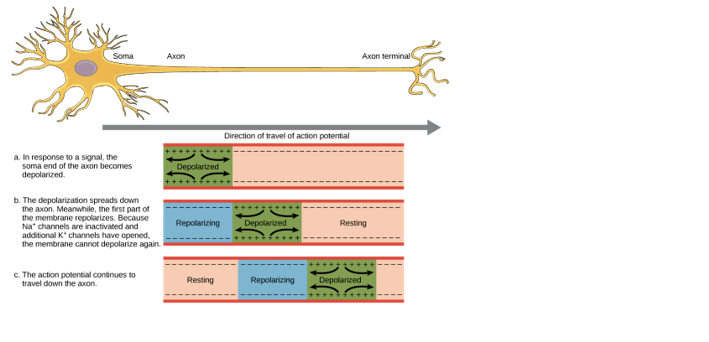
Correct Answer is A
Explanation
Perforins are immune system molecules that create holes in the cell membranes of their target cells in order to destroy the cell. Perforins are proteins that are released by cytotoxic T cells and natural killer cells
They form pores in the target cell membrane, allowing water and ions to enter the cell and causing it to swell and burst.
The other options are not correct because they do not accurately describe the immune system molecules that create holes in the cell membranes of their target cells. Interferons, cytokines, and lymphotoxins do not create holes in cell membranes.
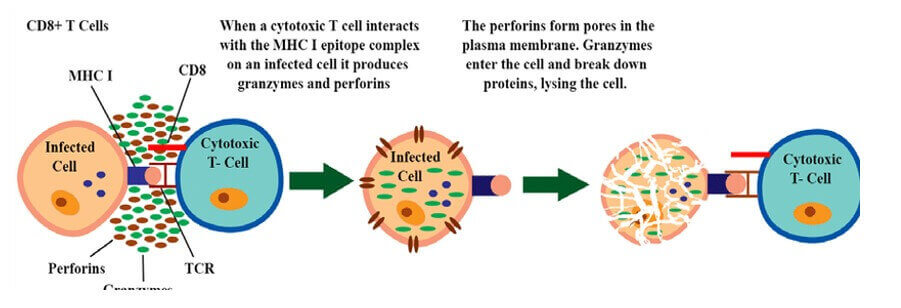
Correct Answer is B
Explanation
Given the new findings that worm infestation can relieve the effects of certain autoimmune disorders, the hypothesis should be modified to state that worm infestation reduces the severity of certain autoimmune disorders.
This option best reflects the new information and suggests a potential benefit of worm infestation in relation to autoimmune disorders. The other options do not accurately reflect the new findings and do not provide a clear modification to the hypothesis.
Correct Answer is C
Explanation
The correct answer is c. Fibrinogen. Fibrinogen is a protein present in blood plasma that plays a key role in blood clotting. When an injury occurs and bleeding begins, fibrinogen is converted into fibrin, which forms a mesh-like structure that helps to trap blood cells and form a clot.
A. Monocytes are a type of white blood cell, not a protein present in blood plasma.
B. Platelets are cell fragments that play a role in blood clotting, but they are not a protein present in blood plasma.
D. Lymphocytes are a type of white blood cell, not a protein present in blood plasma.
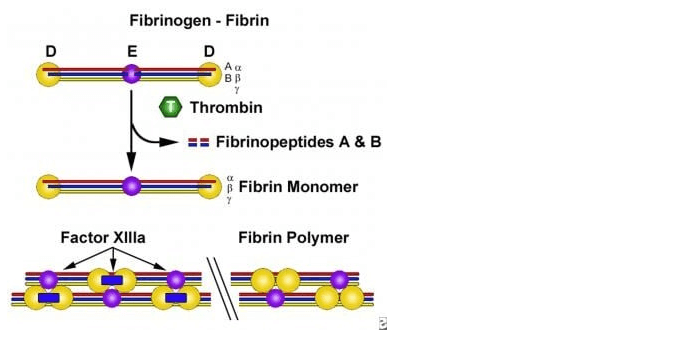
Correct Answer is D
Explanation
The correct answer is d. A substance with a pH of 3 is 10 times more acidic than a substance with a pH of 4. The pH scale is a logarithmic scale, which means that each change of one pH unit represents a tenfold change in the hydrogen-ion concentration. A substance with a pH of 3 has a hydrogen-ion concentration that is 10 times greater than that of a substance with a pH of 4.
A. A substance with a pH of 3 is not two times more alkaline than a substance with a pH of 4.
B. A substance with a pH of 3 is not 10 times more alkaline than a substance with a pH of 4.
C. A substance with a pH of 3 is not two times more acidic than a substance with a pH of 4.
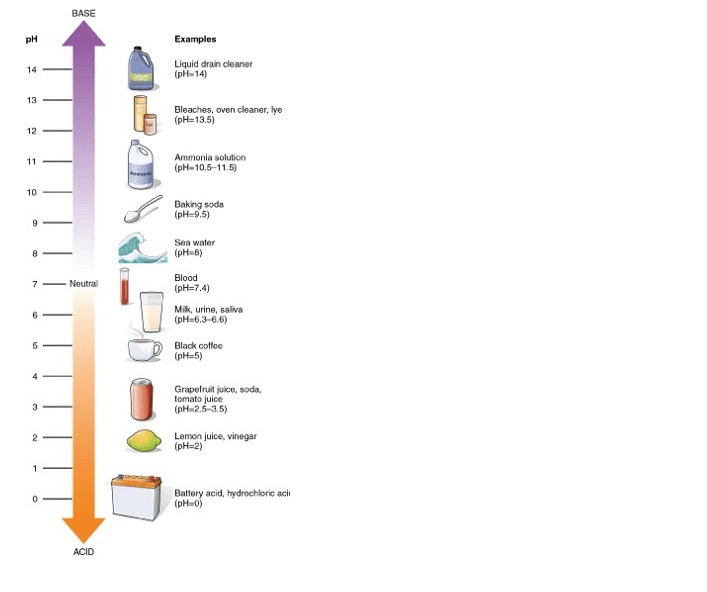
Correct Answer is C
Explanation
The correct answer is c. Lacteal vessels. Lipids absorbed in the small intestine will first enter lacteal vessels, which are small lymphatic vessels located in the villi of the small intestine. These vessels transport the absorbed lipids to the lymphatic system, where they eventually enter the bloodstream.
a. Veins and b. Arteries are blood vessels that transport blood throughout the body. Lipids absorbed in the small intestine do not directly enter these vessels.
d. Interstitial spaces are spaces between cells and tissues that contain interstitial fluid. Lipids absorbed in the small intestine do not directly enter these spaces.
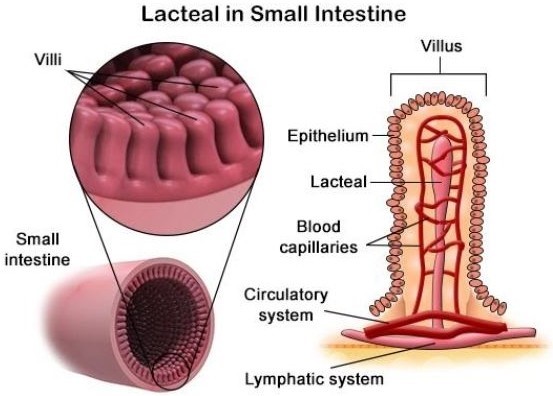
Correct Answer is D
Explanation
The apocrine gland is a component of the integumentary system that secretes pheromones. Pheromones are chemical signals that are released by an individual and can affect the behavior or physiology of other individuals of the same species.
The other options are not components of the integumentary system that secrete pheromones. The fossa ovalis is a depression in the interatrial septum of the heart, the seminiferous tubule is a structure in the testes where sperm are produced, and the dermal papilla is a structure at the base of a hair follicle that provides nutrients to the hair.
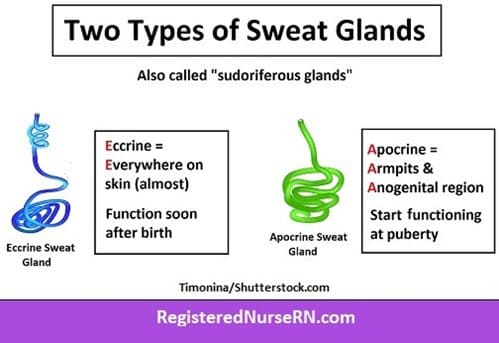
Correct Answer is C
Explanation
The statement "Experiments cannot validate hypotheses, only falsify them" can be restated as "A hypothesis that has not been falsified remains provisional." This means that a hypothesis is considered valid until it is disproved by experimental evidence. However, even if a hypothesis has not been falsified, it is still considered provisional and subject to further testing and scrutiny.
a."Until disproved, an explanation for an observation is valid" is similar to the correct answer but does not capture the provisional nature of a hypothesis.
b."Certain concepts cannot be subjected to direct experimentation" is not a restatement of the original statement.
d. "Proving a hypothesis exempts it from further testing" is incorrect because no hypothesis can be definitively proven and all hypotheses are subject to further testing and scrutiny.
Correct Answer is A
Explanation
A chloride ion has a negative charge because it gained an electron. When an atom gains an electron, it becomes negatively charged because it now has more electrons than protons. In the case of a chloride ion, the neutral chlorine atom gains an electron to become a negatively charged chloride ion.
The other options are incorrect because they do not result in a negative charge. Losing an electron would result in a positive charge. Losing or gaining a proton would change the identity of the atom and is not related to the formation of a chloride ion.
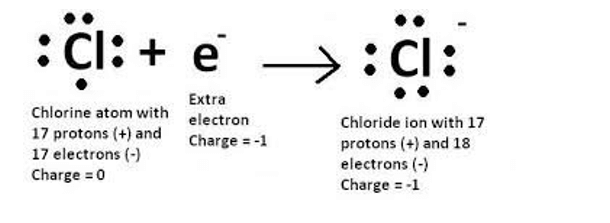
This question was extracted from the actual TEAS Exam. Ace your TEAS exam with the actual TEAS 7 questions, Start your journey with us today
Visit Naxlex, the Most Trusted TEAS TEST Platform With Guaranteed Pass of 90%.
Money back guarantee if you use our service and fail the actual exam. Option of personalised live tutor on your area of weakness.
